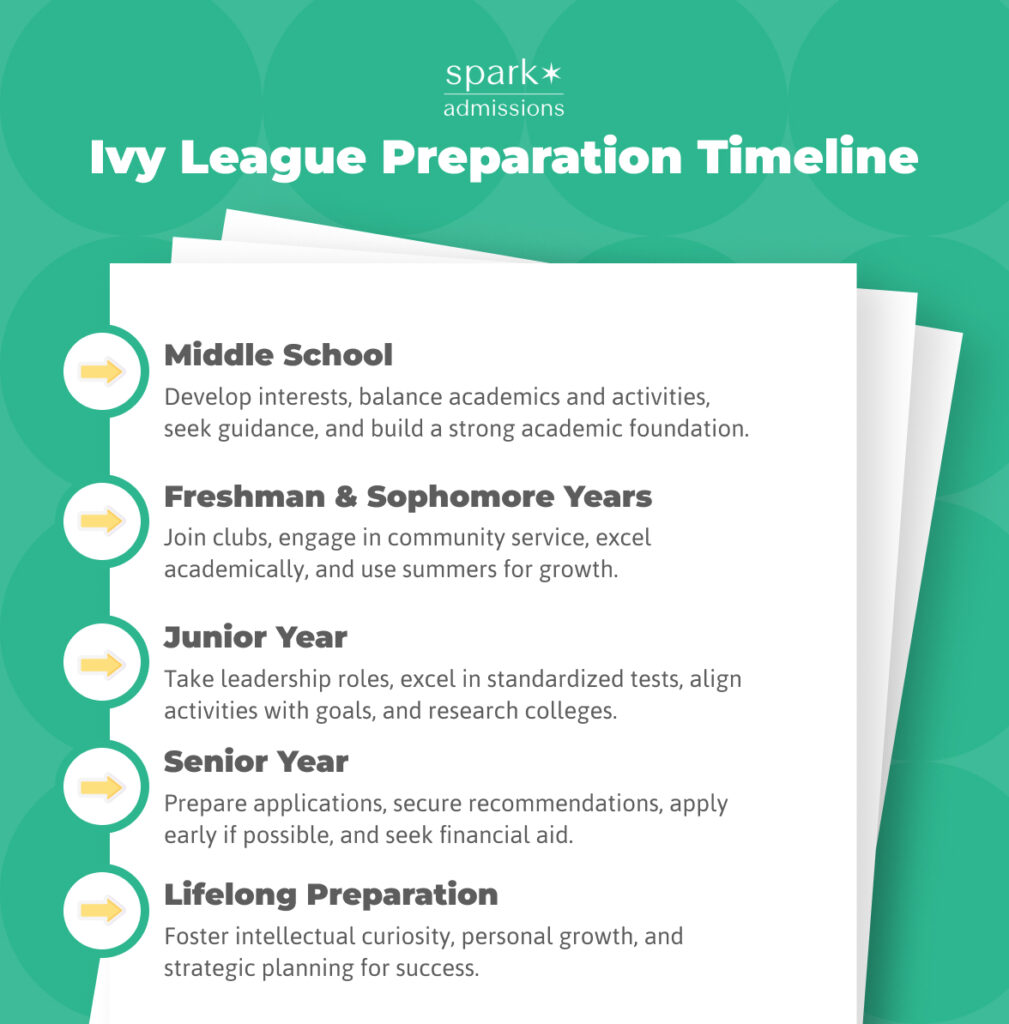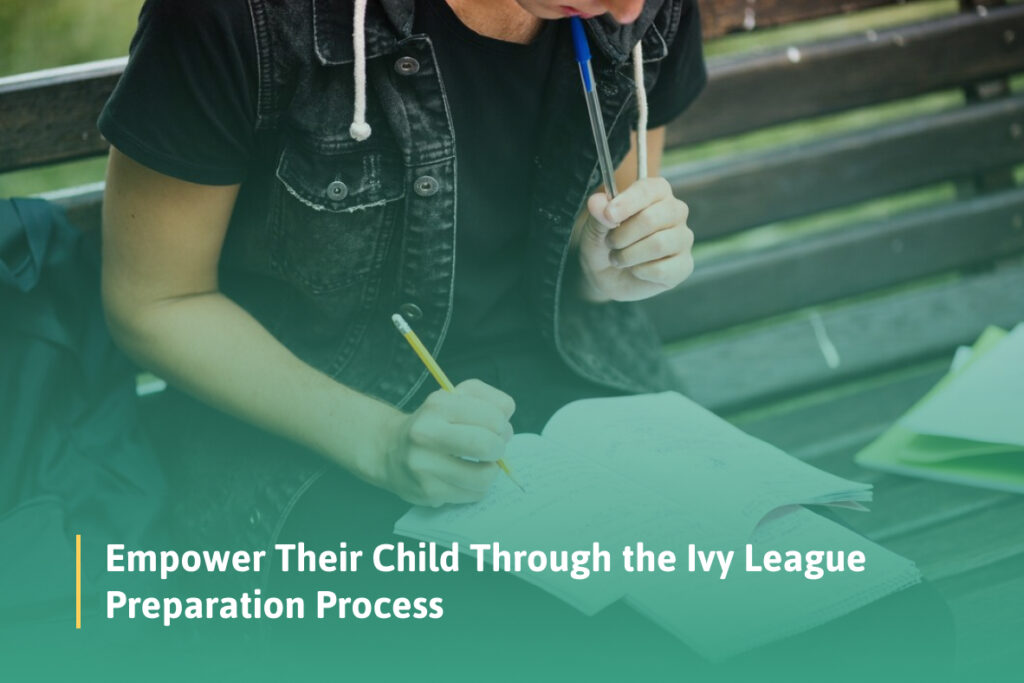- Blog
- > Ivy League Admissions
Complete Guide to Ivy League Preparation
- Dr. Rachel Rubin
- | January 8, 2025

The complete guide to Ivy League preparation is essential for aspiring students, as attending an Ivy League university is an ambitious and rewarding goal that requires strategic planning and preparation. With admission rates at historic lows and competition fiercer than ever, it’s crucial to begin early and build a comprehensive approach that highlights your unique strengths.
While there’s no universal blueprint for success, laying a strong academic and extracurricular foundation during your middle school and high school years can significantly enhance your chances. By challenging yourself, developing a clear academic narrative, and demonstrating genuine passion and leadership, you can position yourself as a standout applicant for these prestigious institutions.
Ivy League Preparation Timeline

Preparing for the Ivy League application process can commence at any age, and each stage offers unique opportunities for growth and readiness. In the early years of high school, succeeding in rigorous courses and maintaining substantial extracurricular involvement is paramount. Also, students should be involved in rigorous summer programs and have significant community involvement, even as freshmen and sophomores in high school.
As students progress to junior year, honing academic excellence, participating in leadership roles at school and in the community, and excelling in standardized tests become focal points of Ivy League application preparation. Making sure that your summer activities are adding to a strong narrative is also crucial.
However, Ivy League University preparation isn’t limited to the high school years alone. Even in middle school, cultivating a love for learning, engaging in diverse activities, and fostering a curious and open-minded approach to the world can lay the groundwork for future academic success. Ultimately, the preparation for Ivy League applications transcends any specific age; it’s about the way in which you embrace a lifelong commitment to intellectual growth, personal development, and a genuine passion for making a difference in the world. Below, we’ve provided a chronological timeline outlining the college application items you can prepare for across all grades.
How to Prepare for Ivy League Admissions in Middle School
Preparation for Ivy League admissions can begin as early as middle school. One of the key steps at this stage is to start developing deep interests. Whether these interests lie in the arts, academics, or athletics, engaging in meaningful activities fosters dedication and commitment. For example, a student might explore acting, music, coding, writing, or a specific sport. Even if these fascinations evolve over time, the discipline and passion cultivated through such pursuits can shape a student’s profile as a future Ivy League applicant.
Additionally, aspiring Ivy League students are often distinguished by their ability to balance multiple commitments. Participating in a variety of activities while managing academic responsibilities demonstrates adaptability and time management skills. This capacity to excel in both extracurricular pursuits and challenging studies sets the stage for the well-rounded, high-achieving profile that Ivy League schools value. Middle school provides an ideal opportunity to begin honing these skills, ensuring that students are prepared to handle the demands of high school and beyond.
Middle school is also an ideal time to start working with an Ivy League admissions consultant. With professional guidance, students can strategically explore their interests, select activities that align with their long-term goals, and develop skills that admissions committees look for in top applicants. A consultant can also provide valuable insights into building a strong academic foundation, optimizing extracurricular involvement, and creating a personalized roadmap for success. Early collaboration ensures that students and families are well-prepared to navigate the competitive admissions landscape with confidence, laying the groundwork for a compelling high school experience that aligns with Ivy League expectations.
How to Prepare for Ivy League Admissions in Freshman and Sophomore Years
The early years of high school are pivotal in setting oneself up for success when it comes to Ivy League admissions. For instance, freshman and sophomore years are an ideal time to get involved in clubs and activities that align with your academic interests. By participating in these organizations early, you can gain valuable experience and expertise, positioning yourself to take on leadership roles later. This consistent involvement showcases your dedication to a particular field or passion, a quality Ivy League schools deeply value.
Another critical step is establishing consistent community service involvement. Volunteering with the same organization regularly over time demonstrates commitment and allows you to make a meaningful impact. By focusing your efforts, you can later become an advocate for the population or cause you are supporting. Such advocacy highlights your leadership and genuine concern for community issues, setting you apart as an applicant with a strong sense of purpose.
Finally, use your summers wisely to further personal and academic growth. Whether through academic programs, internships, or volunteer opportunities, summers provide an excellent chance to continue learning and developing. Demonstrating growth during this time reflects your initiative and eagerness to make the most of your opportunities, qualities that Ivy League admissions committees seek in prospective students.
How to Prepare for Ivy League Admissions in Junior Year
Junior year is a time to establish yourself as a leader both in school and within your community. Leadership can take many forms, and there are countless ways to demonstrate your ability to inspire and guide others. Whether through initiating a project, leading a team, or organizing an event, showcasing your leadership skills highlights your ability to take initiative and create meaningful impact.
At this stage, it is especially important to take on leadership roles in school clubs and community organizations. Positions such as club president, team captain, or community organizer not only demonstrate your commitment but also emphasize your capacity to manage responsibilities effectively. Admissions committees value students who can motivate others and contribute significantly to their environment, making these roles vital for your profile.
Moreover, your summer activities should reflect growth and progression. Focus on building a robust resume through advanced academic programs, internships, or impactful community advocacy. These endeavors demonstrate your intellectual curiosity and dedication to personal development. Consistently advancing in your chosen areas of interest over the summer reinforces your narrative as a focused and dynamic applicant, preparing you for the competitive Ivy League admissions process.
When Should You Start Applying for Ivy League Colleges?
The ideal time to start applying for Ivy League colleges typically falls during the summer before your senior year. It’s essential to familiarize yourself with each Ivy League school’s specific application requirements, such as essays, recommendations, video submissions and research abstract opportunities, along with deadlines, so that you can plan your college application strategy effectively. We strongly advise completing the Common App essay, Additional Information and the Activities Section during the summer before your senior year. School-specific essay prompts are typically released on August 1st, so it’s crucial to initiate this process early to accommodate multiple drafts and revisions effectively. Additionally, we would encourage you to identify your additional recommenders in August and promptly request recommendations, aiming for completion by the end of September or early October.
Lastly, ensure you allocate ample time to decide whether you’ll apply through Regular Decision or an early application option (such as Single Choice Early Action or Early Decision), as this choice will significantly shape your time management and planning. The more proactive you are in making this decision, the more effectively you can organize your application timeline.
While many action items take place during the summer before your senior year and during the beginning of senior year, the preparation for these applications should begin much earlier, preferably in freshman or sophomore year. Building a strong academic foundation, excelling in extracurricular activities, and honing your personal academic narrative should be a gradual process throughout high school. Additionally, starting to explore Ivy League schools and beginning to understand their unique cultures and offerings as early as freshman year can be beneficial in shaping your academic and extracurricular trajectory towards your desired Ivy League education. That said, as much as you may have your sights set on a specific school, it’s important that you prioritize finding a school that is the best fit for you and that aligns with your interests and needs. In addition, you should apply to a wide range of schools to ensure that you are admitted to college.

How to Prepare Yourself or Your Child for Ivy League University Academics
They say that to be prepared for something in life, you need to be demonstrating that you can do it. This is the case for high schoolers who are admitted to Ivy League schools. These students are already intellectually curious. They are already taking the most challenging course loads, involved in countless extracurricular activities, and engaged in their communities. In fact, most of the students we work with find that high school is more challenging than attending an Ivy League university because they have to do so much to prove themselves in order to gain admission to Ivy League colleges, which are so competitive.
Preparing for Ivy League academics requires careful planning and dedication to excel in an academically demanding environment.
Aspiring Ivy League students should proactively cultivate their academic skills, develop effective study habits, and immerse themselves in challenging coursework. Additionally, understanding the expectations of an Ivy League education and preparing mentally and emotionally for the rigorous journey ahead is crucial for success in these esteemed institutions.
Take Challenging Courses
Taking on a rigorous course load is, by far, the most important thing to do when aspiring for Ivy League admission. In order to be a viable applicant, you need to take the most challenging courses provided by your high school. You also need to earn strong grades in these classes.
The answer to the common question of “is it better to get an A in an Honors class or a B in an AP class?” is that for Ivy League admissions, you need to get As (for the most part) in AP courses. That level of academic success will require an incredible amount of focus and honesty with yourself about what you can handle. If an AP class is going to be too challenging for you, it is better not to take it.
Maintain a Balance Between Social and Academic Life
Ivy League schools want students with exceptional social skills. Being able to develop deep friendships during high school and work well with others is one of the single most distinguishing qualities for those who gain admission into Ivy League schools.
Students who are liked by others, easily bring people together, and have a strong voice among their peers will be happier and more successful at developing relationships. At Spark, we have found students’ social skills to be one of the key distinguishing factors for those who are successful at gaining Ivy League admission.
Colleges can measure a student’s social skills through their leadership and through their college interviews or video submissions.
Develop Your Time Management Skills
Without question, the most organized students are the students who can handle balancing the many things one needs to accomplish to get into an Ivy League college. Students need strong grades, a tremendous amount of extracurricular activities that tell a particular story, time spent serving the community and forming relationships with and leading their peers. These various tasks can only be accomplished by students who exhibit exceptional time management skills. We help students learn how best to manage their time and determine which activities make the most sense to pursue, given that a student’s scarcest resource is their time.
Cultivate Good Study Habits
Good study habits are rarely taught at school, yet it is critical to acquire them. Such habits include planning out your time every night and prioritizing what will take the most time for you to accomplish. Successful students also take significant time on the weekends to study for upcoming tests and quizzes and work on writing papers that have been assigned. Strong students never leave things until the night before.
Other critical practices include attending the office hours that teachers provide. All teachers should offer time outside of class when they are available to answer questions, and the strongest students tend to be those who attend these sessions with teachers. You will learn much more from this individualized instruction, and any teacher will appreciate your commitment to learning.
Also, it is always crucial to review what you got wrong and why on past tests or papers so that you can continue improving by learning from your mistakes. Topics will build on each other, and the better basis you have in a subject, the easier it will be for you to build on it.
Don’t forget to ask questions during or after class, but also, stay alert and take good notes during class. That way you will realize when you are stuck and won’t be afraid to ask for help. It’s much easier to get assistance the moment you do not understand something than to wait until you convince yourself that it’s too late to catch up.
That being said, remind yourself that it’s never too late to ask for help. High school is a time to practice and learn how to advocate for yourself and your own learning! This skill will serve you well in college and beyond.
Practice Getting Involved
Getting involved in middle school and high school is a pivotal way to prepare for life at an Ivy League university. It’s not just about academics; getting involved is an opportunity to explore passions, develop social skills, and build a strong sense of community. Whether joining a sports team, participating in a club, writing for the school newspaper, or volunteering in the community, experiences like these offer a rich tapestry of opportunities to discover one’s interests and talents.
Involvement in extracurricular activities can also provide a sense of belonging, foster leadership skills, and create lasting friendships. Middle school and high school is a time to expand your horizons, and being active in various aspects of school life can lead to personal growth and future interests that will greatly shape your college experience.

5 Ways For Parents to Empower Their Child Through the Ivy League Preparation Process
Preparing for Ivy League admissions is a demanding journey for students, and parental support plays a pivotal role in their success. Here are five actionable tips to guide and encourage your child through this process without overwhelming them.
1. Encourage Independence
One of the best ways to support your child is by fostering their independence. Allow them to take ownership of their academic and extracurricular decisions while offering guidance when needed. This approach helps them build confidence, develop decision-making skills, and demonstrate initiative—qualities that Ivy League schools value highly.
2. Provide Emotional Support
The pressure to excel academically and socially can be overwhelming for students. Be a source of reassurance and encouragement, reminding them that their value goes beyond grades and test scores. Celebrate their efforts and achievements, and create a safe space where they can share their concerns or anxieties.
3. Help with Organization
Parents can play a practical role by helping their child stay organized. Assist them in creating a calendar to track application deadlines, test dates, and major milestones. Ensure they have access to resources like study materials or information about summer programs. However, avoid micromanaging; instead, act as a supportive partner in their planning process.
4. Facilitate Opportunities
Expose your child to opportunities that align with their interests and goals:help them research internships, summer programs, or extracurricular activities that complement their academic aspirations. Provide transportation or financial support for programs when possible, ensuring they can pursue their passions effectively.
5. Respect Their Goals and Choices
While it’s natural to have dreams for your child, it’s essential to respect their own aspirations. Encourage them to explore schools and programs that genuinely interest them, even if they deviate from your expectations. Ivy League success is about finding the right fit, and your child’s happiness and fulfillment should take priority.

Post-Acceptance Strategies for Success
Celebrate Your Achievement
Being accepted into an Ivy League university is a monumental accomplishment, and it’s important to take time to celebrate this milestone. Share the good news with friends and family, and express gratitude to the teachers, mentors, and supporters who guided you along the way.
Their encouragement and guidance have been integral to your journey. If you’ve applied to other schools, don’t forget to notify them of your decision and withdraw any pending applications to help streamline the admissions process for other students.
Prepare for the Transition to College
Transitioning to an Ivy League school requires thoughtful preparation:
- Academically: Strengthen skills in writing, research, and time management. Look for preparatory programs, summer bridge courses, or orientation sessions that can help ease the transition.
- Socially: Join online forums or social media groups for admitted students to connect with future classmates. Research clubs, organizations, and activities on campus that align with your interests to identify opportunities for involvement.
Navigate Financial Logistics
Carefully review the terms of any grants, scholarships, or loans, and plan for additional costs like textbooks, travel, and personal expenses. If needed, reach out to the school’s financial aid office for clarification or adjustments. Create a budget that factors in all potential expenses, ensuring you’re prepared for the financial demands of college life.
Building a Support Network
Your success in college depends in part on having a strong support system.
Seek out professors, upperclassmen, or alumni who can offer guidance. Familiarize yourself with academic advising, mental health services, and career centers. These resources can provide crucial support during challenging times.
Set Goals for College Success
Start college with clear academic and personal goals. Create a roadmap for your major, identifying key courses, research opportunities, and internships that align with your aspirations.
Beyond academics, set goals for personal development and involvement in extracurricular activities. Balancing ambition with a realistic plan will help you make the most of your college experience.
Achieving Ivy League Success Starts with Preparation
Preparing for Ivy League admissions is a journey that begins well before the senior year of high school. It requires a combination of academic excellence, strategic extracurricular involvement, and thoughtful personal growth.
By starting early, students can build a strong foundation that showcases their intellectual curiosity, leadership skills, and commitment to their passions. Whether through challenging coursework, meaningful community service, or impactful summer activities, every effort contributes to crafting a compelling application.
Ultimately, the path to Ivy League success is not just about meeting admissions criteria but about becoming a well-rounded, driven individual ready to thrive in a rigorous and dynamic environment. With careful planning, dedication, and support, students can turn their Ivy League aspirations into reality.


